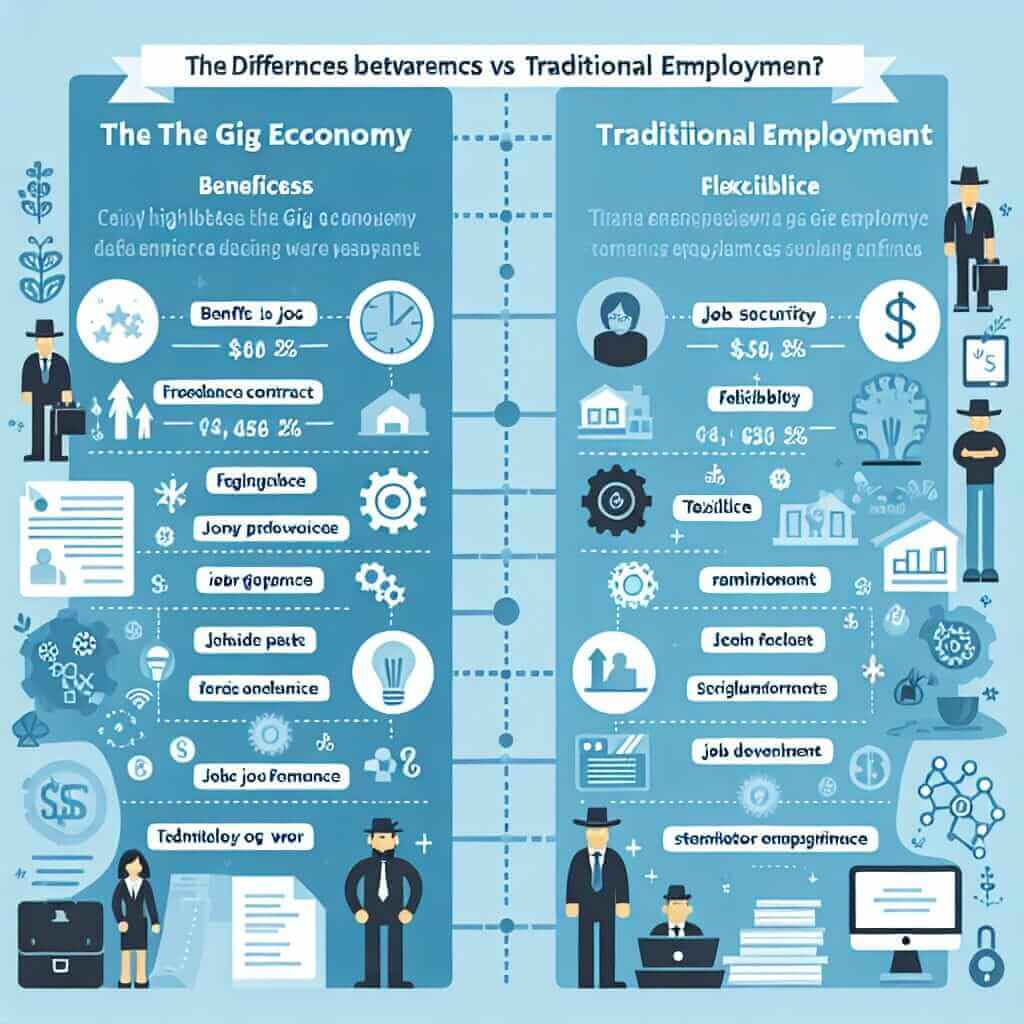The IELTS Reading test is designed to assess a wide range of reading skills, including the ability to understand information, determine the author’s purpose, and grasp the implications within the text. One recurring theme in recent IELTS Reading examinations is the dynamic nature of the gig economy and its impact on traditional employment benefits. This topic is not only relevant to global economic trends but also rich with vocabulary and complex grammatical structures, making it ideal for IELTS practice.
Analyzing recent test trends, topics related to economic shifts and employment paradigms have appeared frequently. Given the growing gig economy, candidates should expect this theme to appear in future exams.
Main Content
Reading Test: Gig Economy and Traditional Employment Benefits
Reading Passage:
The gig economy is a labor market characterized by short-term contracts or freelance work as opposed to permanent jobs. This economic model has rapidly gained prominence with the advent of digital platforms that facilitate the exchange of goods and services. However, while the gig economy offers flexibility and independence for workers, it also significantly impacts traditional employment benefits.
Historical Perspective:
Historically, traditional employment provided workers with numerous benefits, including health insurance, retirement plans, paid leave, and job security. These benefits were integral to employee welfare and long-term financial stability.
The Shift to a Gig Economy:
In contrast, gig workers often forgo these benefits due to the nature of their employment. Companies like Uber, Freelancer, and Upwork employ independent contractors who are responsible for their own insurance, retirement savings, and tax obligations. This shift leaves gig workers vulnerable and financially insecure.

Case Studies:
Consider the case of a full-time graphic designer versus a freelance graphic designer. While the full-time employee enjoys health benefits, retirement plans, and paid leave, the freelancer must navigate these challenges independently. These discrepancies highlight the inequalities brought by the gig economy.
Economic and Social Implications:
The broader economic implications are significant. Governments face challenges in regulating this evolving labor market, and social safety nets may be strained as more workers move to freelance roles without traditional benefits. Consequently, there is a growing debate on whether gig workers should be granted similar benefits as traditional employees.
Questions
Multiple Choice (Choose the best answer):
-
Which of the following best describes the gig economy?
- A. A job market dominated by permanent employment
- B. A labor market with short-term contracts and freelance work
- C. A market where goods and services are exchanged traditionally
- D. An employment model focusing on company-provided benefits
-
What is one of the major differences between traditional employment and gig work according to the passage?
- A. Job security
- B. Flexibility
- C. Digital platforms
- D. Tax obligations
True/False/Not Given:
-
The gig economy guarantees health benefits for its workers.
- True
- False
- Not Given
-
Governments have successfully regulated the gig labor market.
- True
- False
- Not Given
Sentence Completion:
-
Historically, traditional employment provided workers with numerous benefits, including __.
-
Companies like Uber employ independent contractors, leaving them responsible for their own __.
Answer Key and Explanations
- B. A labor market with short-term contracts and freelance work (This option directly describes the gig economy as defined in the passage).
- A. Job security (The passage highlights that traditional employment offers job security, which gig work often lacks).
- False. (The passage clearly states that gig workers forgo benefits like health insurance).
- False. (The passage mentions that governments face challenges in regulating the gig economy).
- health insurance, retirement plans, paid leave, and job security.
- insurance, retirement savings, and tax obligations.
Common Mistakes
- Misinterpreting information: Ensure to read each question carefully and recheck the passage to confirm the information.
- Skimming errors: While skimming is an essential skill, avoid missing crucial details.
- Vocabulary confusion: Familiarize yourself with specific terms related to employment and economic trends.
Vocabulary
- Freelance /ˈfriːlæns/ (verb): Working for different companies at different times rather than being permanently employed by one company.
- Contractor /ˈkɒntræktə(r)/ (noun): A person or company that undertakes a contract to provide materials or labor to perform a service or do a job.
- Vulnerable /ˈvʌlnərəbl/ (adjective): Exposed to the possibility of being attacked or harmed, either physically or emotionally.
- Regulate /ˈreɡjuleɪt/ (verb): Control or maintain the rate or speed of (a machine or process) so that it operates properly.
Grammar Focus
Comparative Structures:
Understanding the use of comparatives is essential when discussing differences:
- “While the gig economy offers more flexibility, it provides fewer benefits compared to traditional employment.”
- Comparative phrases: “more… than,” “less… than,” “the same as.”
Advice for High IELTS Reading Scores
- Practice regularly: Consistency is key. Engage with academic texts daily.
- Expand your vocabulary: Use flashcards and vocabulary lists focused on economic and employment terms.
- Improve skimming and scanning skills: Develop these skills to locate key information quickly.
- Manage your time: Practice under timed conditions to better manage the time in the actual exam.